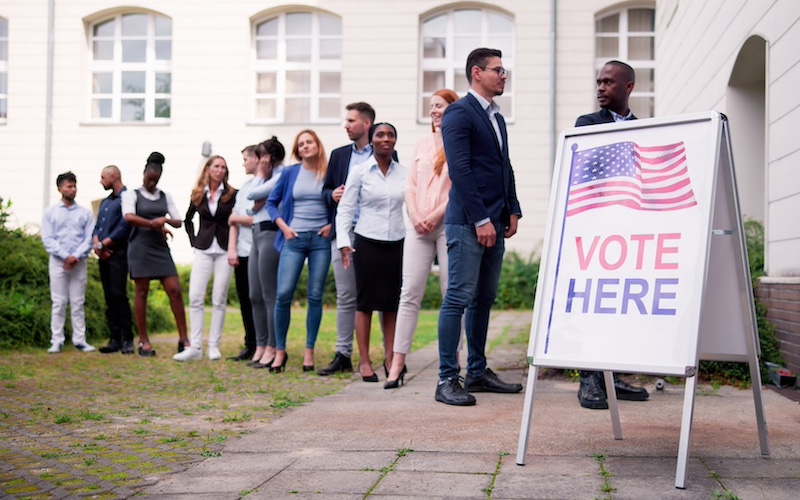
Long lines are one barrier to voting for some people. But there are ways to avoid them. Photo: Shutterstock
Sometimes, we have every intention of doing the right thing. We intend to file our taxes on time, renew our car registration, and pay down that credit card debt. But then life happens. Suddenly, even the best intentions can dissolve into excuses, justifications, and, ultimately, panic when we realize it’s too late.
That’s especially true when it comes to voting. Millions of us don’t do it. In fact, in any given election, between 35 and 60% of eligible voters across the country don’t cast a ballot. Both big and small things stand in the way. Some barriers are psychological. Voters may feel uninspired by the choices and not personally invested in the stakes. (If that’s your view, check out our blog on why your vote matters.) Other barriers are more a matter of organization and logistics.
For those who find logistics get in the way, we offer five of the most common barriers to voting and solutions to help you overcome them.
Barrier #1. I missed the voter registration deadline.
So, voter registration deadlines have passed, and you haven’t registered. (If you’re not sure, check if you are registered here.) Fortunately, missing a voter registration deadline in New England is no longer the issue it once was. You can register right up to Election Day in Connecticut, Maine, New Hampshire, and Vermont. Only in Rhode Island and Massachusetts do you need to register beforehand. In Rhode Island, voters must register 30 days before the election –either online, by mail, or in person. This year, you must register by Oct. 6th. In Massachusetts, voters must register 10 days before the election. This year, you must register online, by mail, or in person by Saturday, Oct. 26th.
Barrier #2. I can’t get time off from work.
Let’s be frank: in a participatory democracy, it would make sense to make Election Day a national holiday. For better or worse, in the United States, it still isn’t. That means plenty of people stress about finding the time to vote on what is a working day for most people. Most states have not made moves to formalize time off to vote. In New England, only Massachusetts requires employers to provide time off (unpaid) to vote. (Specifically, those are the first two hours the polls are open.)
But here’s the good news –it’s getting easier to vote anyway, even if you work in a job that makes getting to the polls impossible. Thanks to early voting options and voting by mail, most of us no longer have to worry about taking time off from work to vote. It also eliminates related worries like waiting in long lines or finding polling stations. In fact, in the 2020 national elections, roughly 70% of the more than 150 million ballots cast were cast before Election Day, according to the U.S. Census Bureau.
Every state in New England, except New Hampshire, offers early in-person voting, including weekends and times outside business hours. And even in New Hampshire, where there is no early in-person voting, you can vote by absentee ballot if you have a specific reason. Connecticut, Rhode Island, Massachusetts, Vermont, and Maine all have ways to vote early or by absentee ballot. Click here to learn more about your state.
Barrier#3. I don’t have identification or was told I didn’t have the correct identification.
Every state has different rules when it comes to showing identification at the polls. In New England, only New Hampshire and Rhode Island require that you show an ID on the day you vote. In Connecticut, you can vote without an ID if you sign a form confirming your identity. No matter the rules in your state, it’s probably always a good idea to carry an ID when you head to the polls. Valid forms of ID include state and voter ID cards, U.S. passports and passport cards, driver’s licenses, and tribal, military, and student IDs.
Barrier#4. I don’t have transportation.
For years, the sticking point for many of us was that we lived far from a polling station and didn’t own a car or have access to public transit. Fortunately, organizations and businesses have joined forces to solve this issue. In 2024, Lyft, in partnership with the NAACP, is offering free and discounted rides to polling stations. Rideshare2vote is also offering rides to anyone who needs them. (It’s also the place to volunteer if you’d like to offer a ride to others.) Check with your local bike-share program as well. In past years, Bluebikes, with stations in Boston, Arlington, Cambridge, Everett, Newton, Somerville, and Watertown, has also offered free rides to the polls on Election Day in Massachusetts.
Barrier#5. I can’t find the polling place.
Okay, that can happen. But there’s an easy fix. Make a plan for election day. Look up the location of your polling station here in advance. Then, check a map to make sure you know where you’re going and figure out how you’re going to get there. Also, remember that you may have to stand in line, so build in some extra time for that, especially when there’s a presidential election.
Understandably, all of us get sidetracked by life from time to time. No worries. But let’s face it: In today’s world of wider options, there are fewer reasons to let anything stand in the way of voting. Especially with so much on the line. So, go vote. The planet is depending on you. And don’t forget to pick up your “I Voted” sticker on the way out.



